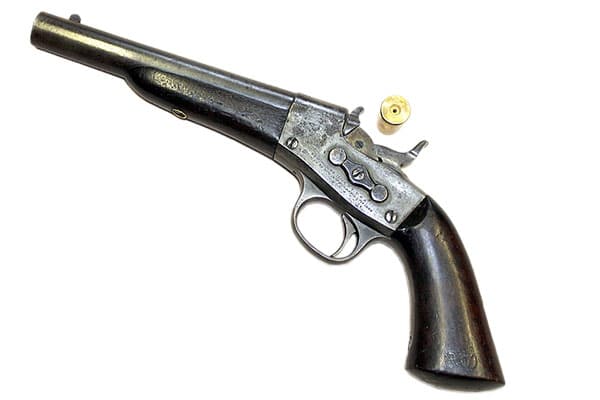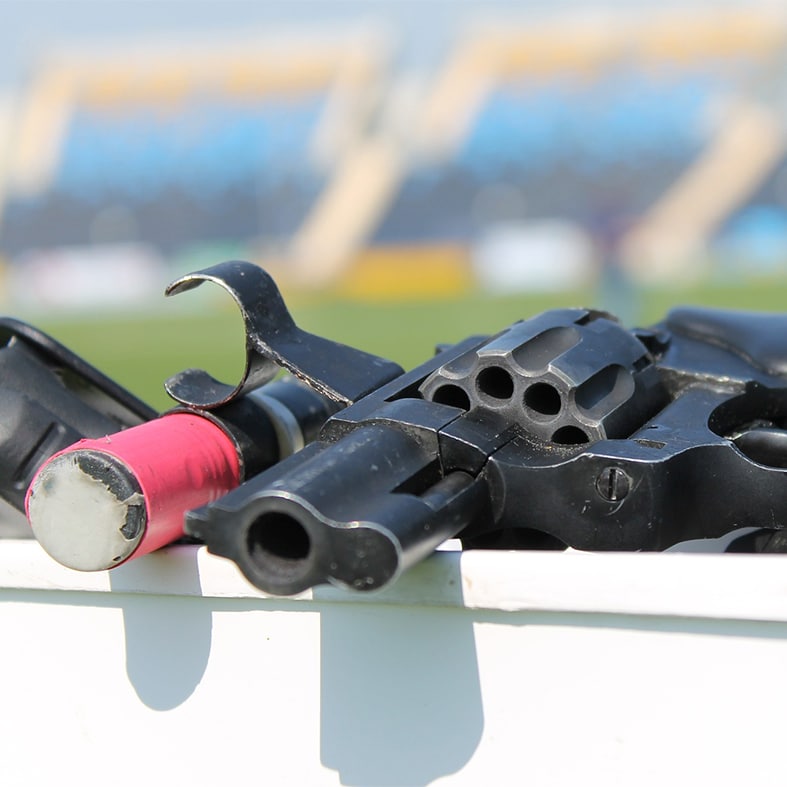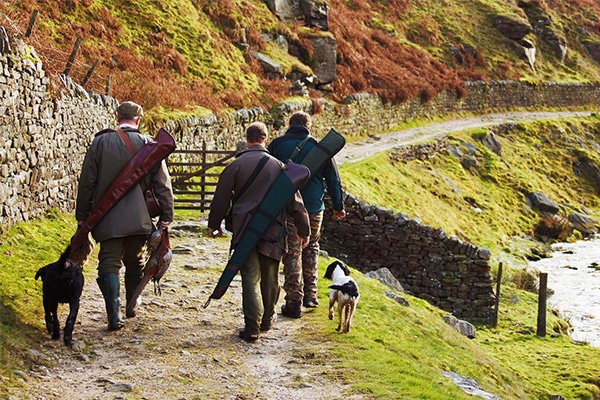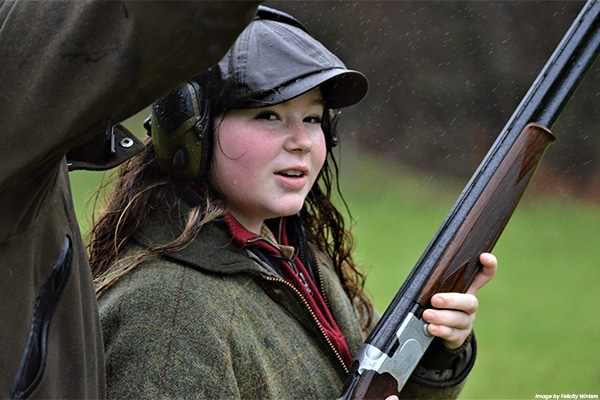
Antique and imitation firearms
Explaining the law around antique and imitation firearms, including those referred to as curiosity pieces or ornaments.
Get information on the legal shooting season for mammals and birds in the UK.
Apply for funding for your project or make a donation today
Comprehensive information and advice from our specialist firearms team.
Everything you need to know about shotgun, rifle and airgun ammunition.
Find our up-to-date information, advice and links to government resources.
Everything you need to know on firearms law and licensing.
All the latest news and advice on general licences and how they affect you.


Home » Firearms » Antique and imitation firearms » Starting pistols and dummy launchers
Section 19 of the Firearms Act 1968 makes it an offence for someone to have with them a loaded shotgun, a loaded air weapon, or any other firearm (whether loaded or not) together with ammunition suitable for use in that firearm, and imitation firearms in a public place without lawful authority or reasonable excuse (the proof whereof lies on the person).
Blank firing handguns and starting pistols are classed as imitation firearms and realistic imitation firearms in law dependent upon provisions laid down by the Violent Crime Reduction Act 2006, and are both subject to Section 19 of the Firearms Act under the broad term of imitation firearms.
In essence, it is an offence to possess any imitation firearm in a public place (including buildings accessible by the public) without a reasonable excuse.
The Firearms Act 1968 defines a public place as including: “any highway (or highway road within the meaning of the Roads (Scotland) Act 1984) and any other premises or place to which at the material time the public have or are permitted to have access, whether on payment or otherwise”, and “premises includes any land”. NB. Vehicles are also classed as public places if the vehicle is present in a public area.
A reasonable excuse for the possession of an imitation firearm in a public place would be that it is being used in connection with dog training.
The Firearms Act does not provide a statutory definition of what is meant by “lawful authority” or “reasonable excuse”. We believe that “lawful authority” would not necessarily apply to sports people, as this seems to relate to those issued with firearms in connection with official duties such as police or military personnel.
“Reasonable excuse” would apply to sports people if the person were on their way with their firearm etc to or from somewhere in connection with its use, such as going to or from its place or use i.e. on private land where you have permission.
It would be hard to provide a reasonable excuse where you are carrying an imitation firearm and youwere not about to be engaged in dog training or some activity in connection with dog training. For example, takingthe gun to be repaired, to lend it to a fellow dog trainer or going to and from a dog training event/venue.
Simply leaving your imitation firearm in your vehicle or training bag until you need to use it would not constitute a reasonable excuse and would be an offence.
Currently no legislation governs the use of imitation firearms on private premises where you have the right to be for the purposes of using an imitation firearm.
Legislation requires that an imitation firearm has to be realistic to a real firearm. Dummy launchers which utilise a spigot (Turner Richards type) are not firearms, nor are they an imitation firearm as generally they do not look like a real gun.
Some American-made dummy launchers come with a shoulder stock and pistol grip and may be interpreted as an imitation firearm, however the courts have not been asked to clarify these types of launcher.
If you own such a launcher then we advise that you ensure, when possessing one in a public place, you are carrying it or using it only in connection with dog training. The alternative is proving that you had a reasonable excuse, which could be difficult, and the police may treat it as an imitation firearm as described above.
Standard Turner Richards type dummy launchers (using a spigot) that haven’t been adapted to resemble a gun by adding a pistol grip or butt stock, may be left in your vehicle and carried without any restriction. It is worth knowing that some police officers may not know about the legalities of such items.
If you find yourself in a difficult position, politely recommend the police officer or other person to contact their firearms licensing department manager for advice or call the BASC firearms department on 01244 573 010 for help and advice.
The association of Chief Police Officer’s Firearms and Explosives Licensing Working Group issued a circular letter to all police forces dated 16th November 2006 following advice from the Forensic Science Service and other technical experts about the status of Turner Richards type dummy launchers. The letter states “that our view is that the Turner-Richards type launcher, utilising a spigot, is not a firearm for the purposes of the relevant UK legislation”. Anybody facing problems with legal action may request a copy of this letter from the BASC Firearms Department.
Some areas of the UK are open for public access and recreation. Most open access lands are still owned by private individuals who can provide you with permission to use their land for the purposes of dog training, however these open areas are now classified as public places as the public have a right of access.
In open access areas the police have the right to stop and question you similarly as if they were in a town or street. Section 19 of the Firearms Act applies to open access land and imitation firearms may only be used if you have a reasonable excuse. However as open access areas are owned by individuals, they may also be governed by local and national byelaws. Permission must always be sought from the owner before using open access land.
It is also important to bear in mind that a large area of open access land may be made up of smaller properties, each being owned by different land owners, so it is important to note the land boundaries to avoid straying onto other property where you do not have the right to use an imitation firearm.
Common sense is required when dog training with any imitation firearm or dummy launcher to avoid being reported to the police, either maliciously or by persons who are unaware of your training activity.
It’s advisable to choose a suitable and possibly secluded area to train your dog and to avoid causing alarm to other countryside users. However, you will always be exposed to the possibility of receiving complaints when in a public place.
To ensure added protection and to help the police if questioned, you may wish to obtain a letter from the landowner, stating you have permission to carry out dog training with blank firing handguns or dummy launchers. A signed letter of permission would protect your position as it is physical proof of the landowner’s authority and will strengthen your reasonable excuse at such a time as you are providing it to the police.
Your reasonable excuse will simply be provided verbally, eg. you are ‘training your gun dog to prevent it being ‘gun shy’’. This is immediately complimented by the fact you will usually have a dog with you at that time, however there is no substitute for a letter of permission.
If you are confronted by any park ranger or police officer who wishes to take the matter further, advise them to speak to the landowner to check your permission and to contact the local police firearms licensing department manager or contact the BASC firearms department on 01244 573 010 for help and guidance.
Parks, woodlands and other municipal areas open for public use are usually governed by bylaws. Byelaws usually prohibit the carriage and use of firearms and weapons.
You must always seek permission from the owner of and land where you wish to carry out dog training with imitation firearms or dummy launchers. Please also bear in mind that dogs may also be prohibited by byelaws per se.
Using public areas will always leave you open to the possibility of criticism or complaint by other users and discretion is required when permission has been granted to prevent causing any fear to others. BASC advises that you secure a letter of permission from the landowner for you to carry while training, which will aide you when being questioned by passers-by, the police or park rangers.
Got a question? Email us on firearms@basc.org.uk or call 01244 573 010.
© BASC July 2023

Explaining the law around antique and imitation firearms, including those referred to as curiosity pieces or ornaments.

All firearms and shotgun certificate holders must comply with specific conditions relating to security.

Providing guidance and information on the process and legalities of a young person applying for their first shotgun certificate.